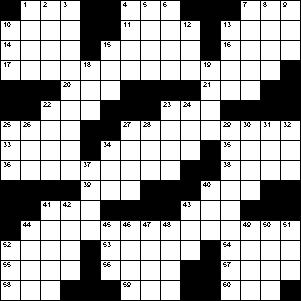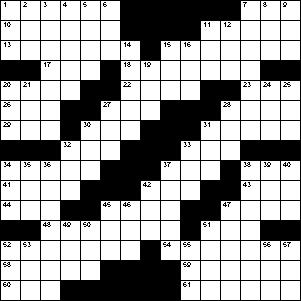November 19, 2005
Cross, part 4
A continuing dissection of one reader's experience reading about one man's journey into America's crossword obsession and that same man's obsession with macking on the ladies. (Not caught up? Read parts one, two, and three.)
Before I continue with chapter two, a reader pointed out an egregious mistake that I skimmed right over -- and it was right there on the first page of the introduction. Romano says a crossword has "a proportion of white squares to black squares that never falls below 70 percent". In fact, a crossword grid should never be more than one-sixth (or about 17 percent) full of black squares. Here is a picture of a 15-by-15 crossword grid with almost as many black squares as you can have and still stay under 30 percent, which I think most people would be startled to see in the New York Times:

Honestly, it's hard to cram in that many black squares without ending up with two-letters words in the grid somewhere. And that's not even quite the maximum -- you can squeeze in one more if you put one in the center square:

Although that grid would get rejected for having 80 words in the grid, which is two over the maximum of 78.
Now then. We left off in the middle of chapter two. Let's see which bit next aroused my ire.
As a general rule, while British puzzles are harder to solve than American ones, they're also easier to construct -- you as the builder don't need to agonize about coming up with stacks of three fifteen-letter answers, for instance, or undergo the drudgery of making sure that every letter in your puzzle [is cross-checked] (and that all the words are in the dictionary).
Where to begin? I corrected his bad description (previously noted) of cross-checking, which he words as "making sure that every letter in your puzzle connects to at least two others". And oh the DRUDGERY of it.
Honestly, a regular daily crossword is just not that hard to construct (for a crossword constructor). A themeless with stacked 15s, sure, now that's hard -- but that's not what most people make, and comparing the hardest American-style crossword to construct with the easiest British-style crossword to construct is a pretty egregious example of goalpost-moving. In many ways the two are not so comparable anyway -- while it is easier to construct the grid for a black-square cryptic, in which only half the letters in each word need to be checked, one does want to choose words which lend themselves to wordplay. And then there's writing the clues, which requires its own set of skills, and is certainly more difficult than writing American-style crossword clues.
But then some cryptics are what we here in America call variety cryptics, in which the grid often has some tricky gimmick which constrains the construction, and those can be a bitch and a half to make. Certainly this grid was harder to construct than any American-style crossword I've ever made (there's a link to the solution in the upper right, if you'd like to skip ahead to the reveal; should you solve it on your own, the final message won't make much sense out of context, but can be used in conjunction with the answer to this puzzle to reveal a combined final answer phrase).
Finally, he also refers to how, unlike British crossword makers, Americans must make sure that all their answers are in the dictionary. You know, because every dictionary has words and phrases like "Netscape", "Howard Stern", "Pez dispenser", and "rated PG", and British crossword writers are free to include any made-up words they like as long as they are well clued; for instance, "Sneaky professional coming back inside is covered with goo" is a fine clue for SLORPY.
For the maker of a cryptic, structure and layout are the easy bits; the hardest part is making the clues work. For this reason, the editor of a puzzle in a British newspaper tends to be the most prolific or even sole creator of the puzzles that appear within it.
How does the second statement follow from the first? Is he suggesting that people send in grids which the editor then clues for them? And I will weigh in on the plausibility of that "sole creator" thing in a moment. First:
Since cryptics are easier to construct that American puzzles, you don't need legions of freelance contributors, overseen by one all-powerful editor, to make sure one appears in your newspaper every day of the year. All you need is one guy reliably cranking them out for you....
This seemed pretty implausible to me, but since I do not actually live in the UK, how would I know if there was some newspaper I don't know about whose puzzles are all constructed by the same guy? So I asked the NPL's Kea (who does live in the UK, and is an accomplished cryptic constructor himself) if this was indeed yet another made-up fact and he replied, "Yes, it is pretty much tosh." He explains:
For the "plain" daily cryptics in The Times, we have a regular team of about a dozen people, whose work is edited and scheduled by a crossword editor. The Guardian and The Independent similarly have regular teams, and I assume the other "quality" newspapers are the same.For "variety" cryptics, there are three main outlets: the Listener in The Times (on Saturdays), Enigmatic Variations in the Sunday Telegraph and the magazine crossword in The Independent (on Saturdays). All three are supplied by "legions" of freelancers, though I think the Independent does have a core team of setters. Each of these has its own crossword editor (the Listener has two), separate from the daily crossword editor.
A few people are on the daily teams of more than one newspaper (and several of us submit variety cryptics to all the available outlets), but I don't know of any daily cryptic crossword that's sustained by a single person.
Wow, fact-checking is hard! That took, like, five whole minutes.
And thus we have come nearly to the end of chapter two. But there is one more excerpt before we go, which I think neatly encapsulates the problem with this book.
[A]nyone looking into the history of the cryptic is struck by the letters editors seem to receive every time their paper's old constructor is replaced by a new one. [Recalling, of course, that papers do not actually have a single constructor.--Ed.] Most of these letters are either bitter reproaches or paeans of praise -- again, reflective of the strange personal intimacy that characterizes the relationship between English solvers and constructors. Many of them, though -- it seems to be a cottage sport for some solvers -- contain speculation, based on the puzzle's content and form, about the character and habits of the constructor. "He has had an inadequate legal training of which he is ashamed, attended Harrow and not Eton, and is fond of long walks and dogs"; "He's a man of the cloth and a recent widower who drinks." (I made these two up, but they catch the general spirit of the thing.)
Making things up does indeed catch the general spirit of the thing.
Posted by Francis at 01:10 PMQuite apart from his incorrect percentage, his terminology is wrong: it's the proportion of white squares to *total* squares that shouldn't fall below (he claims) 70%. The proportion of white squares to black squares had better be well over 100%.
Posted by: Rick at November 19, 2005 04:27 PMThank you; I knew something else was wrong with that, but was having a hard time articulating it. Just so.
Posted by: Francis at November 19, 2005 05:25 PMMore cartoons, less evisceration? You lured me into your site with frequent cartoons, and now you've left me hanging...
Posted by: Orange at November 19, 2005 05:59 PMThe Spectator also has a weekly variety cryptic, perhaps beneath notice because it is (usually) easier than any of the others. Possibly also because that puzzle doesn't accept outside submissions, relying instead on a small pool of setters? Kea, are you there?
Posted by: Jon at November 20, 2005 10:04 AMI've been enjoying the evisceration. Maybe the new Heaneyland slogan should be "Come for the cartoons, stay for the evisceration!"
Posted by: Doug Orleans at November 20, 2005 12:24 PMI've loved the deserved evisceration of such a dunderheaded book pretending and failing to explain how crosswords, cryptic or otherwise, work. Keep up the vivisection, section by section!
One really doesn't want to earn Francis's's's...
Francis'ses...
Franciscan...
Mr. Heaney's ire. His wrath is ruthlessly wroth.